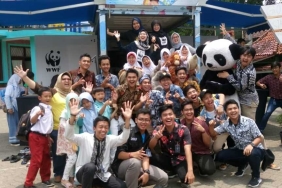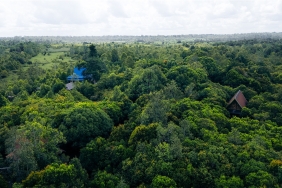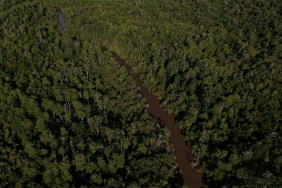THE ROLE OF TEACHERS IN ENVIRONMENTAL CONSERVATION THROUGH EDUCATION IN SCHOOLS
Saving the environment is not only done by environmental practitioners, but all aspects of society should take part in saving the earth. Environmental damage that we all feel is an example of flooding that occurs not only in big cities but even in villages. Water catchment sources are reduced, forests turn into settlements or change functions, then river water becomes cloudy due to siltation due to abrasion / or erosion.
Many simple things can be done from ourselves, one of which is by managing organic waste into compost. At least this can affect the reduction of plastic waste that accumulates in rivers, where we know together, the flow of the river goes through a long process that will be consumed again by us. Many other environmental problems are done by ourselves and have a bad impact on us.
Considering the importance of the environment for living things that are being damaged, of course this is the duty of everyone, such as committees, NGOs, and also schools in this case are teachers. Because teachers are models of learning and role models for students.
To encourage awareness of the environment, WWF Indonesia Foundation seeks to improve the understanding and participation of the community through the program of increasing awareness of sustainable environmental education. WWF's efforts in encouraging an understanding of the importance of the environment since 2016 have been fruitful.
In 2019, Tebo Regent Decree No. 370 was born regarding the implementation of Environmental Education at the elementary and junior high school levels. Schools are the base for awareness, not only for students but also for the wider community. So that efforts to save our environment start from schools in the Bukit Thirty landscape, where lowland forests still exist.
These efforts to save the environment in the Bukit Tigapuluh landscape will have an impact on the daily lives of the people there. The close relationship between people and nature is very strong here, for example the impact of climate change (both floods and droughts) or even human-animal conflict. Therefore, early awareness-raising is one of the solutions to save the environment in the Bukit Tigapuluh landscape.
For this reason, teachers are also WWF-Indonesia's partners. In this story, there are two teachers who live and teach in remote village schools, will share their experiences in early awareness efforts through education. They are Nurwati from Napal Putih Village and Dewi from Kelumpang Jaya Hamlet, Tebo Regency.
Teacher Devotion Amidst Palm Plantations
Teacher Devotion Amidst Palm Plantations
For 9 years, Nurwati, S.Pd has been serving as a teacher in Napal Putih Village, Serai Serumpun Subdistrict, Tebo Regency, Jambi, which is located in the middle of an oil palm plantation.
"The road is certainly not smooth, gravel, clay, potholes, not to mention that if it rains heavily enough, schools and villages can be flooded, forcing children to be closed. When the rains just come, the roads become very muddy. When it's summer, the hot sun beats down on the classrooms, making the children feel uncomfortable in class," Nur explains, describing the environmental conditions around the school where she teaches.
But these conditions did not diminish her determination to teach and encourage children in the village to achieve their dreams. She wants to provide a comfortable place for students to learn.
Nur first started teaching at SDN 204 Napal Putih on August 20, 2013. The enthusiasm of the students was very high, although admittedly it was quite difficult to be able to receive learning materials. Over time, the school began to grow, the number of students increased and it was a sign that more and more children in the village had the desire to learn. "But of course this spirit of learning must be maintained, the school must be able to develop, adjusting to changes," Nur concluded.
Creating a beautiful school, comfortable classrooms, will make children more enthusiastic and happy to come to school, activities outside the classroom will make children more enthusiastic in the teaching and learning process.
Nur explained that not only students must learn, teachers must also continue to improve their capacity, "Teachers also participate in capacity building activities, so that they are able to adjust because changes are very fast in knowledge, information and technology. In addition to increasing capacity in the teaching and learning process, we also learn to make compost fertilizer, process waste into useful items, of course this makes provision for us to increase enthusiasm for students to be able to become personal heroes of the environment."
.
Nur and her colleagues then compiled commitment points to be implemented together at school, namely:
Consciously and sincerely invite children to pick up trash every morning Sorting organic and non-organic waste to be used as compost and utilization of used goods. Fostering scouting members to become compost-producing pawns. Taking care of plants from WWF Developing the function of the greenhouse facilitated by WWF Together with the class association, taking care of the class garden as a form of school cooperation with the class association which plays a very big role in realizing clean, green and comfortable schools. "Hopefully, what SDN 204 has done can inspire other schools and be useful, where we believe that in the next three years we can see how shady and beautiful our school is from the trees that we have previously planted and benefit the surrounding," Nur concluded.
Learn to Be an Educator who Understands Children's Culture
"My name is Dewi Mulyati, an educator far from the city, in the hamlet of Kelompang Jaya, Balai Rajo Village, Kab. Tebo, Prov. Jambi. This hamlet is surrounded by forest and hills. There is no asphalt road here, it is still clay. Often when it rains, it will be flooded and the road in this hamlet will be very muddy, making it difficult to pass. Another interesting thing is that there are many Orang Rimba (SAD) in our village and if we are lucky, we will see elephants passing behind the school."
Dewi began her service at SDN 200/VIII Sungai Karang in 2011, which has now changed to SDN 236/VIII Kelumpang Jaya with the support of the parties. Dewi expressed her experience teaching Suku Anak Dalam, which consists of various tribes, there are indigenous people who are Malay, Batak, there are also migrants from Java and also indigenous people.
"I am happy that I am not only teaching general lessons, but I am also learning to be an educator who understands the culture of each child. Teaching Suku Anak Dalam (SAD) is actually easy and difficult. They have a high enthusiasm for learning, but sometimes it is hampered by their habit of staying in the forest for a long time, usually up to three months, so many lessons are left behind. But these children have high intelligence, making it easy to understand in the process of learning quickly. Fostering a spirit of enthusiasm for learning in the search for knowledge in these SAD children alone is enough to satisfy my heart,"
WWF-Indonesia began its assistance at SDN 200/VIII in 2017. The activity began with an environmental awareness session for students in grades 4 to 6 with interesting methods such as cards, to snakes and ladders games.
"Gradually, the benefits of environmental education began to be felt, which provides an understanding to students that we live very dependent on nature, so utilize nature wisely so that it does not become a disaster in the future," Dewi explained.
One of the activities carried out together with several parties and schools is the activity of planting 500 trees on the riverbank of the local hamlet area. Utilizing the vacant land around the school for wood plant nurseries so that they can be planted around the school as a flood prevention. The school area is a valley area that is prone to flooding during the rainy season.
In addition, there is a vegetable planting activity, which is also a green entrepreneurship lesson to encourage people to utilize their yards at home. The values of love for the environment were then brought into an art performance participated by students with the theme of forest ecosystems.
"This activity trains the mental or self-confidence of students and the importance of good relations with surrounding living things," Dewi added.
The SAD students are very enthusiastic in participating in the learning process. However, the habit of moving around or nomadic cannot be abandoned. So the SAD students are forced to leave the class, even though they are still eager to learn if the mandah time (entering/returning to the forest to gather and hunt) arrives.
"It is a pride for me and my fellow educators with the assistance of Environmental Education (EE), a lot of inspiration and motivation obtained so that I become more enthusiastic in teaching even though I teach with the Double Class Learning method (PKR) because of various conditions such as lack of educators, remote areas, lack of space for learning, educators who cannot attend due to extreme road conditions (during the rainy season) plus facilities and infrastructure that are not sufficient to support the learning process."
With all the limitations and challenges experienced by Dewi and her fellow teachers, they are not discouraged to move forward and build education in remote areas. "Even though we are far and remote, support us to be able to carry out the learning process with adequate facilities and infrastructure and competent leaders."





